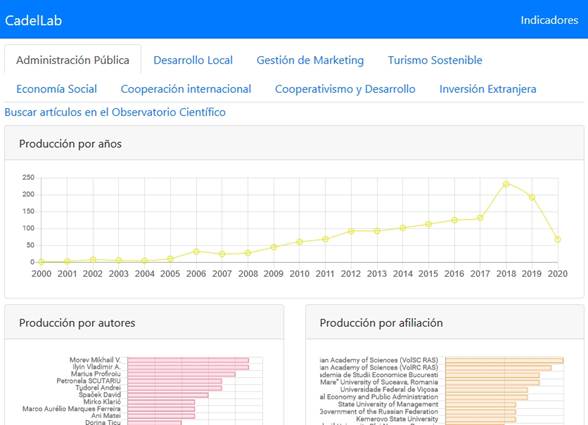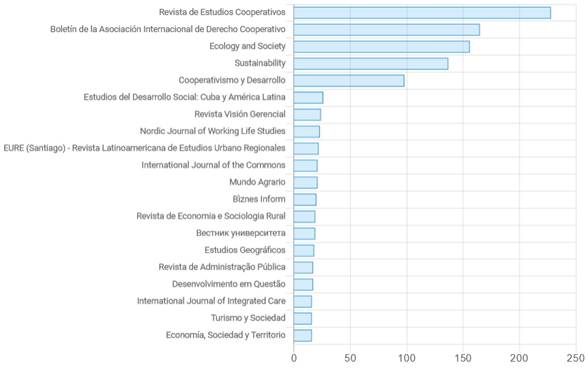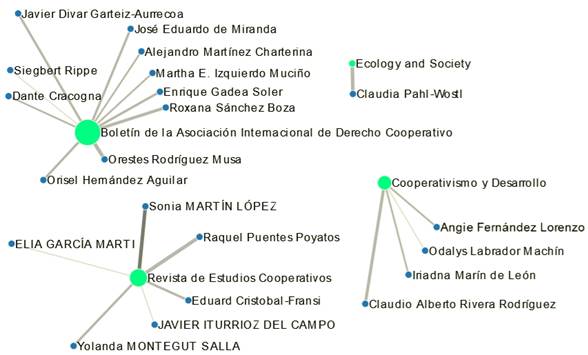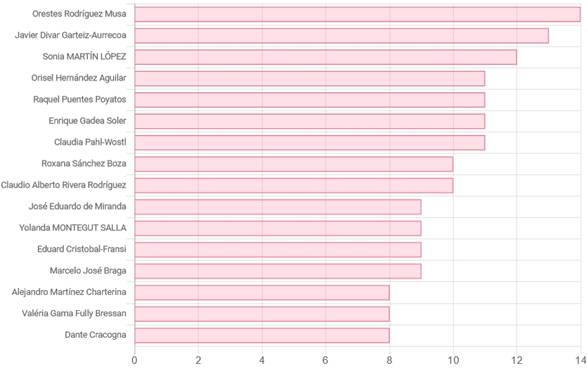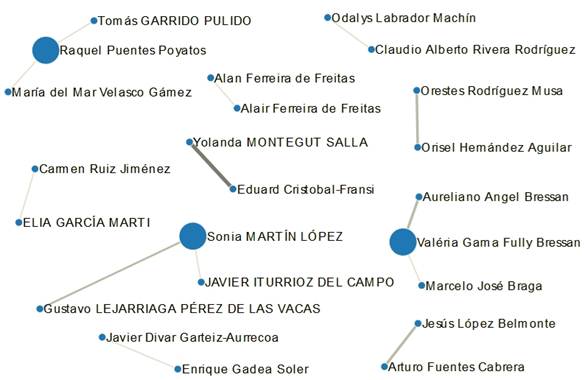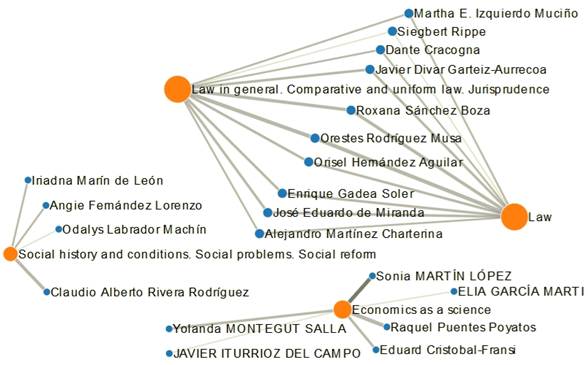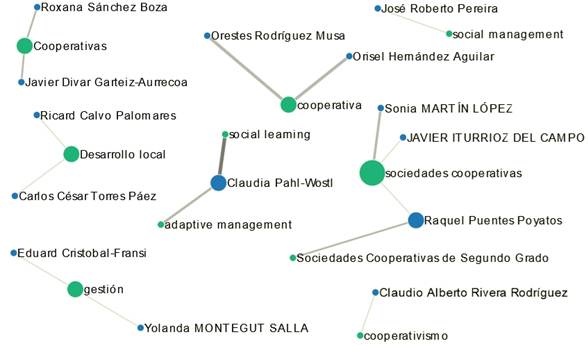Mi SciELO
Servicios Personalizados
Articulo
Indicadores
-
 Citado por SciELO
Citado por SciELO
Links relacionados
-
 Similares en
SciELO
Similares en
SciELO
Compartir
Cooperativismo y Desarrollo
versión On-line ISSN 2310-340X
Coodes vol.8 no.2 Pinar del Río mayo.-ago. 2020 Epub 02-Ago-2020
Original article
Visualization of scientific publications on cooperativism and development through the CadelLAB Observatory
1 Universidad de Pinar del Río "Hermanos Saíz Montes de Oca". Centro de Recursos para el Aprendizaje y la Investigación. Departamento de Publicaciones Científicas. Pinar del Río, Cuba.
Cuban universities have a high commitment to the country on the issue of open access and socialization of scientific knowledge. In this sense, scientific observatories can make a significant contribution. This research aims to showcase the CadelLAB Thematic Observatory based on a case study, intended at visualizing the international scientific publication on Cooperativism and Development, published in open access. The research applied theoretical and empirical level methods for the understanding, development and analysis of the topic. The results obtained visualize in time (2000-2020) the behavior of the domain by different variables, showing the high potentialities that this type of Observatory has to monitor specific thematic axes of knowledge and their dynamics in international scientific publications.
Key words: metric observatory; metric indicators; scientific and technological surveillance; scientific visualization; scientific production; cooperativism and development
Introduction
The world is immersed in the so-called fourth industrial revolution, which involves the domination of the so-called digital network society in each and every activity of society. This forces the less advanced economies to face a major technological challenge, making it necessary to increase the competition of knowledge with technologically and scientifically intensive activities.
One of the developments that the Cuban State is encouraging most, with respect to the knowledge and intensive use of information and communication technologies (ICTs), is the construction of Observatories.
The Observatories are now a high priority for the country. An example of this need is the recent creation of the Cuban Scientific, Technological and Innovation Observatory (OCTI in Spanish)1 of the Institute of Scientific and Technical Information (Idict in Spanish), coordinated by the Ministry of Science, Technology and Environment (Citma in Spanish). This Observatory is oriented to the monitoring of information related to the strategic axes prioritized in the nation, referring to: renewable energies, climate change, food, tourism, ICTs, population ageing, among other important strategic axes at the national level.
Of equal relevance, it is being coordinated at the central level, by the Party and the Government, the Observatory of Demographic Dynamics. It is aimed at strategic territorial issues that require the cooperation of different sectors and instances for their optimal management at different levels of aggregation.
In this line of thought, universities, for years, have also joined the challenge of knowledge management and innovation, as well as their links with different sectors (Núñez Jover et al., 2006).
The model of university that has been built in many countries in recent decades incorporates, in an important way, the generation, dissemination and application of knowledge, which constitutes part of its "third mission" (Etzkowitz, 1983) which, added to traditional teaching and research, has favored the deployment of a wide range of activities that link the university with society (Romero Paz et al., 2020). The universities that achieve this desired stage have been called entrepreneurial universities in Europe since the last century (Etzkowitz, 1998).
Universities are a key entity in the generation and transmission of knowledge; therefore, the need for them to play a more active and intensive role in promoting the use of knowledge by all of society. In this path, the binomial formed by the so-called Social Economy and the University constitute the key elements to promote an Intelligent Economy with values (Julia Igual et al., 2020). Now more than ever, the driving role that the University is taking on as an element of transformation is highlighted. For this reason, there is a call for an increasingly active commitment from the University in its teaching and research mission, also valuing knowledge by promoting entrepreneurship and innovation.
The idea of growth based on integrating and sustainable knowledge requires a greater extension of university activity, and a more accessible university is needed, one that provides greater equality of opportunity and avoids the loss of talent. Cuban universities also have a great commitment with the country's leadership and with society in general, regarding the issue of open access and democratization of scientific knowledge.
Etzkowitz (2016) defines the transfer of results in the university-business link as a two-way flow from university to industry and vice versa, with different degrees and forms of academic involvement. And, one of the expressions of this link is the Observatories according to the mission and vision that they have defined; therefore, the importance and necessity of their construction in perfect harmony with the priorities of the institutions.
One of the main objectives of the Ministry of Higher Education (Mes in Spanish) of the country is the automation of the substantive processes of the universities. In this sense, the computerization, information and communication strategy of each center plays a fundamental role; a large part of its actions depends on the materialization of this challenge.
The publication of Observatories, Information Repositories and Virtual Libraries are some examples of the Computerization and Information Strategy of the centers of the month, which, in turn, corresponds to the new social, economic and political model of the Cuban nation.
Within the universities, there are some examples of observatories designed in different ways, with different purposes, which make use of information of different nature and structure, in short, with great distances of an informational and technical nature between them, but all published under the label of Observatory. Within the network of observatories of the Month you will find The Ministry of Higher Education's Social Observatory, which is being developed in almost all of the country's centers, the Observatory of Higher Education Trends2 at the "Marta Abreu" Central University in Las Villas, and at the University of Pinar del Río (UPR in Spanish), the University-Industry Interface Observatory, coordinated by the Center for the Study of Higher Education3 (CECE-PRI), together with the Technology Observatory4, which focuses exclusively on information published in granted patents, and the Open Access Scientific Observatory5, which monitors full-text articles published by the Directory of Open Access Journals (DOAJ). The last two observatories, (Technological and Scientific), have been developed by the Research Group on Information, Knowledge and Technology Management (proGINTEC)6 of the UPR.
However, although there is projection at the ministerial level and the need to develop Observatories that allow the constant monitoring and surveillance of scientific and technological knowledge of national interest is recognized, the reality is that there are very few experiences applied in the country that allow this true purpose. This scenario allowed the Month to include in the strategic planning of the universities and in the definition of their work objectives the development of different specific Observatories. From this call, the proGINTEC group, which has the technology developed to build metric-size observatories, focused on the design, development and implementation of certain Observatories of territorial university interest.
In this case, the theme of cooperativism and development was chosen because it is an area that has developed a lot since its appearance in England at the end of the 18th century as a reaction to the hard-living conditions of industrial workers (Chaves Ávila & Monzón Campos, 2000). Since then, cooperative ideas and business associations have not stopped growing and experiencing an extraordinary development from the perspective of the social economy (Defourny & Nyssens, 2006). In the last third of the twentieth century, the term social economy has resurfaced again, integrating not only cooperativism, but also other associations whose purpose is not economic profit in itself, but the improvement of living standards, democratic self-control of the economic process and the self-development of workers (Grávalos Gastaminza, 2002).
These ideas are closely related to the Guidelines of the Economic and Social Policy of the Party and the Revolution where it can be seen that the process of cooperativization is called to be a protagonist in the socio-economic scenario of the country in the coming years (Torga Hernández & Rivera Rodríguez, 2017). These authors refer to cooperatives as a transversal axis in the Process of Updating the Cuban Economic Model. The importance of their presence may be conditioned by their conception, since cooperatives are more committed to a social relationship of production, based on labor than on capital (Hechavarría Aguilera & Cruz Reyes, 2016).
This research aims to showcase the CadelLAB Thematic Observatory based on a case study aimed at visualizing scientific articles that have been published in open access on cooperativism and development.
Materials and methods
The research applied theoretical and empirical methods for the understanding and analysis of the subject. It was supported by an extensive documentary and bibliographic analysis, using analysis and synthesis for data discrimination, as well as direct observation for the construction of the different services of the Observatory, together with modeling and systemic-structural analysis.
CadelLAB's information source is the Directory of Open Access Journals (DOAJ), which compiles refereed scientific journals that meet rigorous selection criteria. The technologies used by the Observatory are free software, and the metrics it applies have been validated in various research projects (Díaz Pérez, de Moya Anegón, et al., 2017; Díaz Pérez, Giráldez Reyes, et al., 2017; Giráldez Reyes et al., 2020).
This research used key words, in Spanish and English, related to the topic. The search strategy included the following terms: theory cooperation, cooperative model, social management, cooperative, education, cooperative enterprises, cooperative marketing, cooperativism, cooperatives and social management.
Results and discussion
The CadelLAB Thematic Observatory (Fig. 1) is accessible on the national network at: https://cadellab.upr.edu.cu.
It offers its services online, ranging from search, retrieval and link to downloading scientific articles in full text, to the pre-established display of certain metric indicators in each specific CadelLAB topic.
This Observatory has eight critical monitoring axes, from which it offers its services. Its themes are: Public Administration, Local Development, Marketing Management, Sustainable Tourism, Social Economy, International Cooperation, Cooperativism and Development and, finally, Foreign Investment.
This research analyzed the scientific articles in the area of cooperativism and development that have been published by DOAJ between January 1st, 2000 and July 11, 2020. It showcases that it reaches a total value of 3819 scientific articles published in the domain under research. The evolution of these publications by years showcases a sustained increase since 2008, reaching the highest peak of productivity in 2019 where more than 460 scientific articles were published in the areas analyzed by this research (Fig. 2).
The international scientific journals in open access, which have more than 100 scientific articles on the topics researched, are mainly five; three, in Spanish and two, in English (Fig. 3). The rest of the journals have less than fifty articles available in DOAJ, in the period of time studied.
It is worth mentioning that among the main journals identified at international level on the subject, the journal Cooperativismo y Desarrollo, belonging to the University of Pinar del Río, is in fifth place, with 98 articles.
This journal also keeps in the analysis that was made of the journals that have more occurrence of publication of authors. For example, according to this analysis the researchers Claudio Alberto Rivera Rodríguez, Odalys Labrador Machín, Iriadna María de León and Angie Fernández Lorenzo investigate in the topics related to this study and have a high tendency (more than 6 occurrences) to publish their results in the journal Cooperativismo y Desarrollo (Fig. 4).
The Bulletin of the International Cooperative Law Association is another journal that publishes a large number of articles related to the topics discussed in this research. This publication has the highest occurrence of the domain, there are authors who have published between six and twelve articles in this same source of information, which denotes a high tendency, on the part of these authors, to publish their research results in this source of information (Fig. 4).
When analyzing the main authors of the domain, that is, the researchers with the highest scientific productivity in the topics identified in the search strategy, it was obtained the data of finding also researchers from the University of Pinar del Río. Figure 5 represents the performance of the authors that have published eight or more articles in the topics researched within the area of Cooperativism and Development. In this case, the professors: Orestes Rodríguez Musa (14 articles), Orisel Hernández Aguiar (11 articles) and Claudio Alberto Rivera Rodríguez (10 articles) among other international authors are discarded.
Collaboration is another indicator of significant interest in this study because of the added value of scientific results generated between different researchers. The domain under study reveals a favorable dynamic in the research of the topic, with the most productive authors coinciding relatively with those who tend to work jointly with other researchers. The co-authorship relationships of Orestes Rodríguez Musa with Orisel Hernández Aguiar, as well as those of Claudio Alberto Rivera Rodríguez with Odalys Labrador Machín are showcasen; Yolanda Montegut Salla and Eduard Cristobal-Fransi stand out as the authors who collaborate most in this domain (Fig. 6).
The productivity dynamics of researchers can also be identified by the thematic guilds that each area of knowledge has.
In the domain being researched, four main subjects were identified that group together the largest number of articles that correspond to the search strategy of this research (Fig. 7). For example, a large number of Cuban researchers from the University of Pinar del Río were involved in two of the four subjects in the domain. This reveals the existence of small and medium sized professional guilds, with some thematic specialization within the international domain of the subject; similar behavior occurs with the key words.
Finally, the analysis is deepened beyond the thematic subjects; in this case, identifying the keywords that most occur in the domain (Fig. 8).
The analysis revealed within the area of Cooperativism and Development a group of terms in which more research is being carried out by certain researchers, in the period of time under analysis. Research on cooperative societies, cooperative(s), management and local development stand out significantly. In this last field of knowledge, the scientific productivity (more than five articles) of the researcher Carlos César Torres Páez and Richard Calvo Palomares stands out, as well as the incidence of other researchers from the University of Pinar del Río, in other terms.
In general, this research made it possible to photograph over time (2000-2020) the behavior of publications on Cooperativism and Development available in open access, specifically those that fall within the framework of: theory cooperation, cooperative model, social management, cooperative, education, cooperative enterprises, cooperative marketing, cooperativism, cooperatives and social management. The leading international journals on the subject were identified, as well as the most productive authors, the largest author collaborations, the most established professional thematic guilds, as well as the behavior of authors by keywords. These indicators were chosen because they best represent the relationship dynamics of the different variables that make up a scientific domain.
The potentialities offered by the CadelLAB Observatory of the University of Pinar del Río to monitor specific thematic axes of knowledge were showcased, being able to visualize the behavior of the dynamics of international scientific publications by specific domains.
REFERENCES
Chaves Ávila, R., & Monzón Campos, J. L. (2000). Las cooperativas en las modernas economías de mercado: Perspectiva española. Economistas, 18(83), 113-123. https://dialnet.unirioja.es/servlet/articulo?codigo=93785 [ Links ]
Defourny, J., & Nyssens, M. (2006). Social Enterprise in Europe. EMES Network. [ Links ]
Díaz Pérez, M., de Moya Anegón, F., & Carrillo Calvet, H. A. (2017). Técnicas para la visualización de dominios científicos y tecnológicos. Investigación Bibliotecológica: archivonomía, bibliotecología e información, nesp1 (Número Especial de Bibliometría), 17-42. https://doi.org/10.22201/iibi.24488321xe.2017.nesp1.57884 [ Links ]
Díaz Pérez, M., Giráldez Reyes, R., & Carrillo Calvet, H. A. (2017). Comportamiento métrico de las patentes concedidas en Cuba: Su contribución a la innovación tecnológica nacional. Investigación Bibliotecológica: archivonomía, bibliotecología e información, nesp1 (Número Especial de Bibliometría), 271-289. https://doi.org/10.22201/iibi.24488321xe.2017.nesp1.57893 [ Links ]
Etzkowitz, H. (1983). Entrepreneurial Scientists and Entrepreneurial Universities in American Academic Science. Minerva, 21(2/3), 198-233. JSTOR. https://www.jstor.org/stable/41820527 [ Links ]
Etzkowitz, H. (1998). The norms of entrepreneurial science: Cognitive effects of the new university-industry linkages. Research Policy, 27(8), 823-833. https://doi.org/10.1016/S0048-7333(98)00093-6 [ Links ]
Etzkowitz, H. (2016). The Entrepreneurial University: Vision and Metrics. Industry and Higher Education, 30(2), 83-97. https://doi.org/10.5367/ihe.2016.0303 [ Links ]
Giráldez Reyes, R., Díaz Pérez, M., Rodríguez Font, R. J., Brizuela Chirino, P. R., & Blanco Borrego, J. (2020). Encadenamiento social de la ciencia mediante el Observatorio Métrico de Coronavirus. Universidad y Sociedad, 12(4), 294-302. https://rus.ucf.edu.cu/index.php/rus/article/view/1647 [ Links ]
Grávalos Gastaminza, M. A. (2002). Economía social. Septem ediciones. https://dialnet.unirioja.es/servlet/libro?codigo=245668 [ Links ]
Hechavarría Aguilera, Y., & Cruz Reyes, J. (2016). La innovación social cooperativa, una apuesta por construir una nueva economía social y solidaria. Cooperativismo y Desarrollo, 4(2), 139-148. http://coodes.upr.edu.cu/index.php/coodes/article/view/131 [ Links ]
Julia Igual, J. F., Meliá Martí, E., & Miranda Ribera, E. (2020). Rol de la Economía Social y la Universidad en orden a un emprendimiento basado en el conocimiento tecnológico y los valores. Revista de Economía Pública, Social y Cooperativa, (98), 31-57. https://doi.org/10.7203/CIRIEC-E.98.15905 [ Links ]
Núñez Jover, J., Félix Montalvo, L., & Pérez Ones, I. (2006). La gestión del conocimiento, la ciencia, la tecnología y la innovación en la nueva universidad: Una aproximación conceptual. Pedagogía Universitaria, 11(2), 31-43. http://cvi.mes.edu.cu/peduniv/index.php/peduniv/article/view/363 [ Links ]
Romero Paz, M. de J., Alpízar Terrero, M. Á., León Robaina, R., & Castellanos Pallerols, G. M. (2020). Transferencia de resultados de la investigación científica universitaria a través de las incubadoras de empresas. Retos de la Dirección, 14(1), 235-263. http://scielo.sld.cu/scielo.php?script=sci_abstract&pid=S2306-91552020000100235&lng=es&nrm=iso&tlng=es [ Links ]
Torga Hernández, N., & Rivera Rodríguez, C. A. (2017). Cooperativas de segundo grado en Cuba: Antecedentes y fundamentos para su implementación. Cooperativismo y Desarrollo, 5(1), 1-18. http://coodes.upr.edu.cu/index.php/coodes/article/view/158 [ Links ]
1Available at: http://www.octi.cu
2Available at: http://otes.uclv.edu.cu
3Available at: http://interfaz.upr.edu.cu
4Available at: https://techobs.upr.edu.cu
5Available at: https://sciobs.upr.edu.cu
Received: June 12, 2020; Accepted: July 24, 2020











 texto en
texto en 

